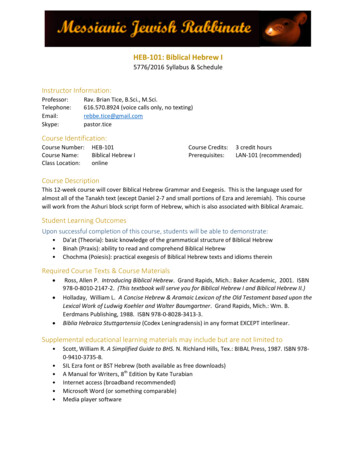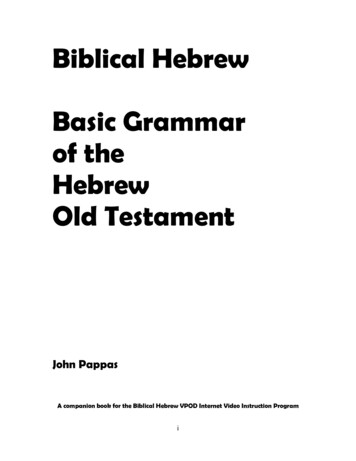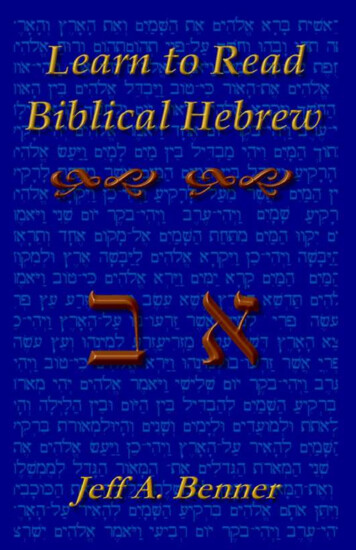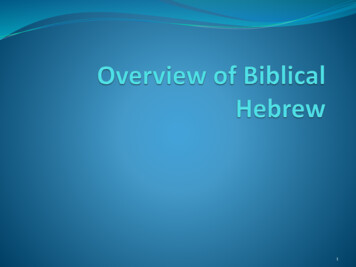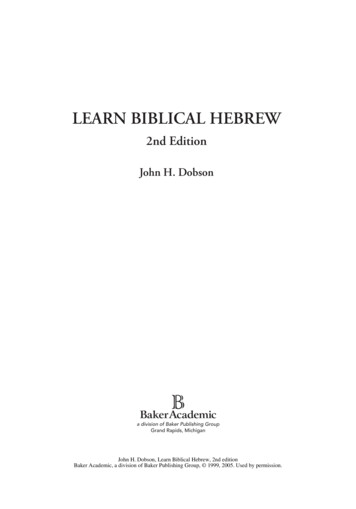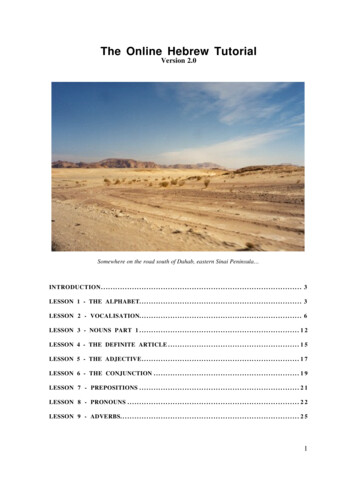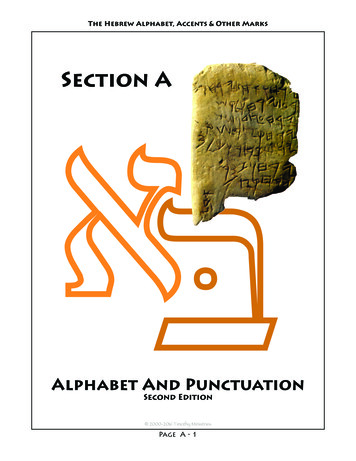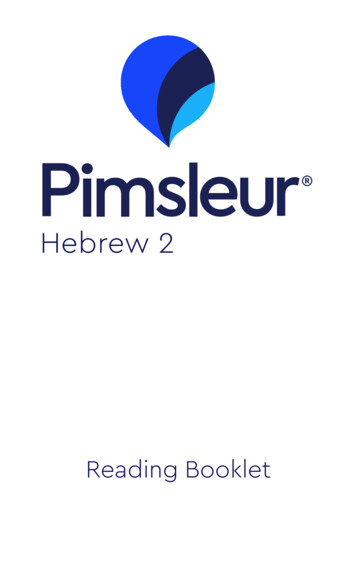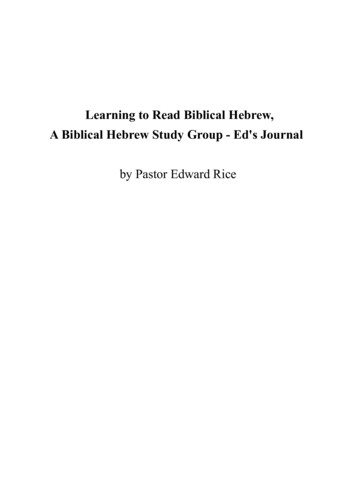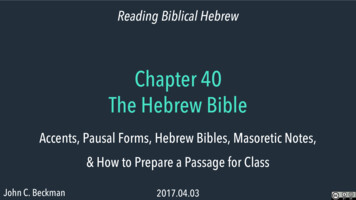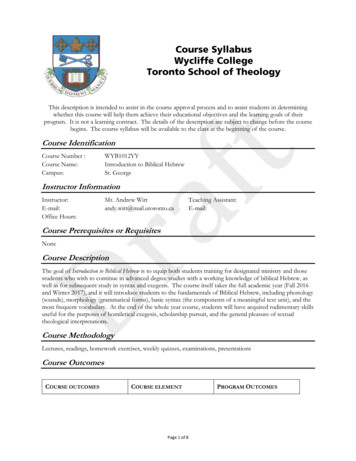
Transcription
This description is intended to assist in the course approval process and to assist students in determiningwhether this course will help them achieve their educational objectives and the learning goals of theirprogram. It is not a learning contract. The details of the description are subject to change before the coursebegins. The course syllabus will be available to the class at the beginning of the course.Course IdentificationCourse Number :Course Name:Campus:WYB1012YYIntroduction to Biblical HebrewSt. GeorgeInstructor InformationInstructor:E-mail:Office Hours:Mr. Andrew Wittandy.witt@mail.utoronto.caTeaching Assistant:E-mail:Course Prerequisites or RequisitesNoneCourse DescriptionThe goal of Introduction to Biblical Hebrew is to equip both students training for designated ministry and thosestudents who wish to continue in advanced degree studies with a working knowledge of biblical Hebrew, aswell as for subsequent study in syntax and exegesis. The course itself takes the full academic year (Fall 2016and Winter 2017), and it will introduce students to the fundamentals of Biblical Hebrew, including phonology(sounds), morphology (grammatical forms), basic syntax (the components of a meaningful text unit), and themost frequent vocabulary. At the end of the whole year course, students will have acquired rudimentary skillsuseful for the purposes of homiletical exegesis, scholarship pursuit, and the general pleasure of textualtheological interpretations.Course MethodologyLectures, readings, homework exercises, weekly quizzes, examinations, presentationsCourse OutcomesCOURSE OUTCOMESCOURSE ELEMENTPage 1 of 8PROGRAM OUTCOMES
By the end of this course,studentsWill gain a basic understandingof the various elements of theBiblical Hebrew language.Emphasis will beplaced on: (1) a basicvocabulary of the mostfrequently occurring words; (2)a knowledge of the mostimportant morphologicalpatterns, paradigms andgrammatical structures; (3)experience in translating simpleHebrew sentences;Will be able to recognizequickly Hebrew grammaticalstructures as well as Hebrewterms and their inflections,accurately translating basicphrases, clauses, and sentences.This outcome will beachieved through thesecourse elements:This course outcomecorresponds to these aspectsof Wycliffe’s statements ofoutcomes (MTS, MDiv)All elements of the courseMTS: 1.7MDiv: 1.7All elements of the courseMTS: 1.7MDiv: 1.7Course ResourcesRequired Course TextsRoss, Allen P. Introducing Biblical Hebrew. Grand Rapids: Baker, 2001.ISBN-10: 0801021472. ISBN-13: 978-0801021473.Optional: Clemens, David M. Supplementary Exercises for IntroducingBiblical Hebrew by Allen P. Ross. Regent Publishing, 2008. ISBN-13: 9781573834254.Elliger, Karl, and Willhelm Rudolph, eds. Biblia Hebraica Stuttgartensia.German Bible Society, 2006. ISBN-10: 1598561626. ISBN-13: 9781598561623.Brown, F., S. Driver, and C. Briggs. The Brown-Driver-Briggs Hebrew andEnglish Lexicon: Coded with Strong's Concordance Numbers. Hendrickson,1994. ISBN-10: 1565632060. ISBN-13: 978-1565632066.Course Website(s) Blackboard https://weblogin.utoronto.ca/This course uses Blackboard for its course website. To access it, go to the UofT portal login page athttp://portal.utoronto.ca and login using your UTORid and password. Once you have logged in to the portalusing your UTORid and password, look for the My Courses module, where you’ll find the link to thewebsite for all your Blackboard-based courses. (Your course registration with ROSI gives you access to thecourse website at Blackboard.) Note also the information atPage 2 of 8
ion-students. Students who have trouble accessingBlackboard should ask [xxx] for further help.]Course Resources on the WebDr. Charles Grebe's lectures using Ross: http://www.animatedhebrew.com/lectures/index.html These will be quite helpful to supplement our class lectures and more fully cover the material fromthe textbook. Check out a lot of the website, which is keyed in to Ross (e.g. worksheets galore!).Dr. Phillip Marshall’s answer key for Ross: swer-keys-to-ross-introducing-biblical-hebrew-ibh/ I hesitate to give you this link, but it is not terribly hard to find with a simple Google search. Thefact of the matter is that your mark on the homework (as outlined below) is not given based on thecorrectness of your answers, but in their completion. You are paying good money to take this courseand learn Hebrew. If you are not going to put in the time to learn it by practicing with the exercises,then there is nothing to gain and everything to lose by cheating on the homework. Use theseanswers as a way to make sure you understand the lessons, and maybe check your first few answersbefore doing the rest.There are a number of links on the web to help you with vocabulary flashcards, and several are keyed to Ross'chapters. The tried and true method is to buy a pack of notecards, cut them in half, and write out thevocabulary. Memrise: this is a free App for your smart phone (Android Apple). Once you login to the app,search for "Ross Introducing Biblical Hebrew," which all the vocabulary for the course divided intotheir corresponding lessons. This is a very effective tool for learning vocab. Biblical Hebrew Vocabulary : Another App for your smartphone (Android Apple), but this onewill run you around 3.00. It has the Hebrew vocabulary for several prominent introductory Hebrewbooks, including Ross. You can also work your way through the top 1000 vocab words from this listtoo. Audio recordings of all the vocab lists and most exercises through chapter 37 of the book.Class ScheduleAs part of the syllabus approval process, would I be able to teach this class meeting twice aweek for 90 minutes, e.g. on Tuesday and Thursday?Unit 1 (Sep 13, 15)Ross chs. 1-2Homework Review, Ross ch. 3Alphabet, Vowels, SyllablesShewa, Inseperable PrepositionsUnit 2 (Sep 20, 22)Quiz, Homework Review, Ross ch. 4Homework Review, Ross chs. 5-6Accents, Other MarkingsDagesh, Article, ConsonantsUnit 3 (Sep 27, 29)Quiz, Homework Review, Ross ch. 7Homework Review, Ross chs. 8-9Nouns, Sentences, WawNoun PatternsUnit 4 (Oct 4, 6)Homework Review, Midterm #1 (Oct 4)Introduction to Verbs, Ross ch. 10Verb System, the PerfectUnit 5 (Oct 11, 13)Quiz, Homework Review, Ross ch. 11Homework Review, Ross chs. 12-13PronounsCases, Construct, SuffixesPage 3 of 8
Unit 6 (Oct 18, 20)Quiz, Homework Review, Ross ch. 14Homework Review, Ross chs. 15-16Reading Week (Oct 24-28)Suffixes (cont.)Suffixes, ParticiplesReviewUnit 7 (Nov 1, 3)Quiz, Homework Review, Ross ch. 17Homework Review, Ross chs. 18-19The Imperfect, Relative ClausesNarrative Sequence, Stative, ?'sUnit 8 (Nov 8, 10)Homework Review, Midterm #2 (Nov 8)Foregrounding/Backgrounding, Ross 20-21Volitives, DisjunctivesUnit 9 (Nov 15, 17)Quiz, Homework Review, Ross chs. 22-23Homework Review, Ross chs. 24-25The InfinitiveSuffixes, NumbersUnit 10 (Nov 22, 24)Quiz, Homework Review, Ross ch. 26Homework Review, Ross chs. 27-28The Verbal Stems, NiphalPiel and PualUnit 11 (Nov 29, Dec 1)Quiz, Homework Review, Ross ch. 29Ross, chs. 30-31HithpaelHiphil and HophalFinals Week (Dec 5-9)Homework / Final Review (6th); Final Exam (8th)SEMESTER BREAKUnit 12 (Jan 5)Introduction to Mechanical Parsing (A-B),Ross ch. 32The Parsing Guide, Intro toIrregular Verbs, I-G, I-AlephUnit 13 (Jan 10, 12)Quiz, Homework Review, Ross ch. 33Homework Review, Ross chs. 34-35Guttural Verbs, III-AlephI-Nun, I-Waw, I-YodUnit 14 (Jan 17, 19)Quiz, Homework Review, Ross ch. 36Homework Review, Ross chs. 37-38III-HeDoubly WeakUnit 15 (Jan 24, 26)Quiz, Homework Review, Ross, ch. 39Homework Review, Ross ch. 40Geminate VerbsMinor Stems, HishtaphelUnit 16 (Jan 31, Feb 2)Homework Review, Midterm #1 (Jan 31)Ross chs. 41-42Gen 12:1-20Unit 17 (Feb 7, 9)Quiz, Homework Review, Ross ch. 43Homework Review, Ross ch. 44Gen 13:1-11Gen 13:12-18Unit 18 (Feb 14, 16)Quiz, Homework Review, Ross ch. 45Homework Review, Ross ch. 46Gen 14:8-16Gen 14:17-24Reading Week (Feb 20-24)Prepare for midtermUnit 19 (Feb 28, Mar 2)Homework Review, Midterm #2 (Feb 28)Ross chs. 47-48Gen 15:1-7, Gen 2:4-9Unit 20 (Mar 7, 9)Quiz, Homework Review, Ross ch. 49Homework Review, Ross ch. 50Gen 2:15-24Gen 2:25-3:7Unit 21 (Mar 14, 16)Quiz, Homework Review, Ross ch. 51Homework Review, Ross ch. 52Gen 3:8-16Gen 3:17-24Unit 22 (Mar 21, 23)Quiz, Homework Review, Ross ch. 53Homework Review, Ross ch. 54Gen 4:1-8Gen 4:9-16Finals Week (Mar 27-Apr 4)Review Class (28th); Final Exam (Apr 4)Page 4 of 8
A Typical Week of Classes:Tuesday Session:(1) Weekly Quiz (20 mins)(2) Review of Homework (30 mins)(3) Shorter Introduction of New Material (30 mins)Thursday Session:(1) Homework Review (30 mins)(2) Longer Intro of New Material (60 mins)EvaluationRequirementsA. Attendance. Attendance is obligatory for each class in accordance with the Student Handbook.Missing classes will hinder your ability to progress in the cumulative nature of learning a newlanguage.B. Completion of Exercises. It is imperative in the study of a language to keep up with the dailywork. Every class period will have an assignment due. A student who does not work thesecompletely will not do well in the course. Working assignments does not mean getting all of theanswers right; it means completing the assignments, surfacing errors based on class discussions andtrying to understand things missed in the homework by consulting the textbook, another student orthe professor (in that order). The homework is designed to prepare the student for quizzes andexams. A student doing consistently well in daily work will probably do well in the exams (unless thehomework is occupying an inordinate amount of time).C. Quizzes. Quizzes will test the memorized material, i.e. vocabulary and paradigms. The two lowestquiz scores will be dropped (assuming all the quizzes are taken). Missed regular quizzes for excusedabsences must be made up by the next class period. If you arrive late for class, you must wait outsidethe classroom until after the quiz is graded and then take it during the first break.D. Examinations. There will be three examinations during each term of the two-term course. Theexamination will include all information studied up to that point. In other words, by their nature,language exams are cumulative, although the focus of each will be on the material since the previousexam.E. Optional: Word Study Presentations. During the second half of the course, students are given theoption of presenting one word-study. This will be a 15-20 minute presentation of research done on aHebrew word, chosen from a list provided by the instructor. Instructions to follow on doing wordstudies. Doing the presentation is not required, but it will give the student bonus points used at theinstructor's discretion to boost her or his mark.Grading BreakdownFall 2016Homework CompletionWeekly QuizzesMidterm Exam #1Midterm Exam #2Final Examination10%20%20%20%30%Winter 2017Homework CompletionWeekly QuizzesMidterm Exam #1Midterm Exam #2Final Examination10%20%20%20%30%TST Grading SystemLetter GradeNumerical EquivalentsGrade PointGrasp of SubjectMatterA 90–100%4.0Profound & CreativeA85–89%4.0OutstandingPage 5 of 8
A-80–84%3.7ExcellentB 77–79%3.3Very �69%0FailureGrades without numerical equivalent:CRDesignates credit; has no numerical equivalent or grade point valueNCRDesignates failure; has no numerical equivalent, but has a grade point value of 0 and is included inthe GPA calculationSDFStanding deferred (a temporary extension)INCPermanent incomplete; has no numerical equivalent or grade point valueWDRWithdrawal without academic penaltyAEGMay be given to a final year student who, because of illness, has completed at least 60% of thecourse, but not the whole course, and who would not otherwise be able to convocate; has nonumerical equivalent and no grade point valuePolicy on Assignment ExtensionsBasic Degree students are expected to complete all course work by the end of the term in which they areregistered. Under exceptional circumstances, with the written permission of the instructor, students mayrequest an extension (SDF “standing deferred”) beyond the term. An extension, when offered, will have amutually agreed upon deadline that does not extend beyond the conclusion of the following term. An SDFmust be requested no later than the last day of classes of the term in which the course is taken. The requestform is available on the college website or from the Registrar’s office.One percentage point per day will be deducted on the course grade if an extension has not beenrequested by the stated deadline.Course grades. Consistently with the policy of the University of Toronto, course grades submitted by aninstructor are reviewed by a committee of the instructor’s college before being posted. Course grades may beadjusted where they do not comply with University grading ets/Governing Council Digital Assets/Policies/PDF/grading.pdf) or college grading policy.PoliciesAccessibility. Students with a disability or health consideration are entitled to accommodation. Studentsmust register at the University of Toronto’s Accessibility Services offices; information is available athttp://www.accessibility.utoronto.ca/. The sooner a student seeks accommodation, the quicker we can assist.Plagiarism. Students submitting written material in courses are expected to provide full documentation forsources of both words and ideas in footnotes or endnotes. Direct quotations should be placed withinquotation marks. (If small changes are made in the quotation, they should be indicated by appropriatepunctuation such as brackets and ellipses, but the quotation still counts as a direct quotation.) Failure todocument borrowed material constitutes plagiarism, which is a serious breach of academic, professional, andPage 6 of 8
Christian ethics. An instructor who discovers evidence of student plagiarism is not permitted to deal with thesituation individually but is required to report it to his or her head of college or delegate according to the TSTBasic Degree Handbook (linked from oks and theUniversity of Toronto Code of Behaviour on Academic icies/behaveac.htm), a student who plagiarizes in this course.Students will be assumed to have read the document “Avoidance of plagiarism in theological writing”published by the Graham L-ibrary of Trinity and Wycliffe Colleges(http://www.trinity.utoronto.ca/Library Archives/Theological Resources/Tools/Guides/plag.htm).Turnitin.com. Students may be required to submit their course essays to Turnitin.com for a review of textualsimilarity and detection of possible plagiarism. In doing so, students will allow their essays to be included assource documents in the Turnitin.com reference database, where they will be used solely for the purpose ofdetecting plagiarism. The terms that apply to the University's use of the Turnitin.com service are described onthe Turnitin.com web site.Other academic offences. TST students come under the jurisdiction of the University of Toronto Code ofBehaviour on Academic Matters behaveac.htm).Writing Style. The writing standard for the Toronto School of Theology is Kate L. Turabian, A Manual forWriters of Term Papers, Theses and Dissertations, 7th edition (Chicago: University of Chicago Press, 2007), which isavailable at Crux Books.Bibliography for the Study of Biblical HebrewHebrew TextsBrown, A. Philip, and Bryan W. Smith. A Reader’s Hebrew Bible. Grand Rapids: Zondervan, 2008.Vance, Donald R. Biblia Hebraica Stuttgartensia: A Reader's Edition. Hendrickson, 2014.Jewish Publication Society's (JPS) Hebrew-English Tanakh.Introductory Hebrew GrammarsCook, John A., and Robert D. Holmstedt. Beginning Biblical Hebrew. Grand Rapids: Baker Academic, 2013.Futato, Mark David. Beginning Biblical Hebrew. Eisenbrauns, 2003.Garrett, Duane A. A Modern Grammar for Classical Hebrew. Nashville: Broadman and Holman, 2002.Greenberg, Moshe. Introduction to Hebrew. Englewood Cliffs, NJ: Prentice-Hall, 1965.Kelley, Page H. Biblical Hebrew: An Introductory Grammar. Grand Rapids: Eerdmans, 1992.Kittel, Hoffer, and Wright. Biblical Hebrew: A Text and Workbook. New Haven: Yale University Press, 1989.Lambdin, Thomas O. Introduction to Biblical Hebrew. New York: Scribners, 1971.LaSor, William S. Handbook of Biblical Hebrew. 2 vols. Grand Rapids: Eerdmans, 1978–79.Pratico, Gary D., and Miles V. Van Pelt. Basics of Biblical Hebrew Grammar. Grand Rapids: Zondervan, 2001.Pratico, Gary D., and Miles V. Van Pelt. Basics of Biblical Hebrew Workbook. Grand Rapids: Zondervan, 2001.Ross, Allen P. Introducing Biblical Hebrew. Grand Rapids: Baker, 2001.Seow, C. L. A Grammar for Biblical Hebrew. Rev. ed. Nashville: Abingdon, 1995.Weingreen, Jacob. A Practical Grammar for Classical Hebrew. Oxford: Clarendon, 1959.Exposition & AidsBrotzman, Ellis R. Old Testament Textual Criticism. Grand Rapids: Baker, 1994.Chisholm, Robert B. A Workbook for Intermediate Hebrew. Grand Rapids: Kregel, 2006. ( Workbook)Chisholm, Robert B. From Exegesis to Exposition. Grand Rapids: Baker, 1998. ( EE)Long, Gary A. Grammatical Concepts 101 for Biblical Hebrew: Learning Biblical Hebrew Grammatical Concepts throughEnglish Grammar. Peabody, MA: Hendrickson, 2002.Page 7 of 8
Mitchel, Larry A. A Student’s Vocabulary for Biblical Hebrew and Aramaic. Grand Rapids, MI: Eerdmans, 1984.Owens, John Joseph. Analytical Key to the Old Testament, 4 vols. Grand Rapids: Baker, 1989.Silzer, Peter James and Thomas Finley. How Biblical Languages Work: A Student's Guide to Learning Hebrew andGreek. 2nd Ed. Grand Rapids: Kregel Academic, 2004.Van Pelt, Miles. English Grammar to ACE Biblical Hebrew. Grand Rapids: Zondervan, 2010.Hebrew Syntax and Reference GrammarsArnold, Bill T., and John H. Choi. A Guide to Biblical Hebrew Syntax. Cambridge: Cambridge University, 2003.Gibson, J. C. L., ed. Davidson’s Introductory Hebrew Grammar–Syntax. 4th Ed. Edinburgh: T & T Clark, 1994.Gesenius, W. Gesenius’ Hebrew Grammar (GKC). Eds. Kautzsch and Cowley. Oxford: Clarendon Press, 1910.Joüon, Paul and T. Muraoka, A Grammar of Biblical Hebrew. 2 Vols. Rome: Pontifical Biblical Institute, 1991.Van der Merwe, Christo H. J., Jackie A. Naudé and Jan H. Kroeze. A Biblical Hebrew Reference Grammar.Biblical Languages: Hebrew 3. Sheffield: Sheffield Academic Press, 1999, 2000.Waltke, Bruce K., and M. O’Connor. An Introduction to Biblical Hebrew Syntax. Winona Lake, IN: Eisenbrauns,1990.Williams, Ronald J. Williams' Hebrew Syntax: Third Edition. Revised and expanded by John C. Beckman.Toronto: University of Toronto Press, 2007.Lexicons and DictionariesArmstrong, Terry A., Douglas L. Busby, and Cyril F. Carr. A Reader's Hebrew-English Lexicon of the OldTestament. Zondercan Hebrew Reference Series. Grand Rapids: Zondervan, 2013.Brown, Francis, S. R. Driver, and Charles A. Briggs. A Hebrew and English Lexicon of the Old Testament. Reprint,Peabody, MA: Hendrickson, 1996. ( BDB)Clines, David J. A., ed. The Concise Dictionary of Classical Hebrew. Sheffield: Sheffield Phoenix Press, 2009.Clines, David J. A., ed. The Dictionary of Classical Hebrew. 6 Vols. Sheffield, UK: Sheffield Academic Press,1993, 1995, 1996, 1998, 2001, 2007.Feyerbend, Karl. Langenscheidt's Pocket Hebrew Dictionary to the Old Testament: Hebrew-English. Maspeth, NY:Langenscheidt Publishers, 1985.Holladay, William L., ed. A Concise Hebrew and Aramaic Lexicon of the Old Testament. Grand Rapids: Eerdmans,1971.Jenni, Ernst and Claus Westermann. Theological Lexicon of the Old Testament (transl. Mark E. Biddle: vol 1-3;Peabody, MA: Hendrickson, 1997.Koehler, Ludwig, Walter Baumgartner, and Johann Jakob Stamm. The Hebrew and Aramaic Lexicon of the OldTestament. Translated by M. E. J. Richardson. 2 vols. Leiden: E. J. Brill, 2002. ( HALOT)Page 8 of 8
It has the Hebrew vocabulary for several prominent introductory Hebrew books, including Ross. You can also work your way through the top 1000 vocab words from this list too. Audio recordings of all the vocab
